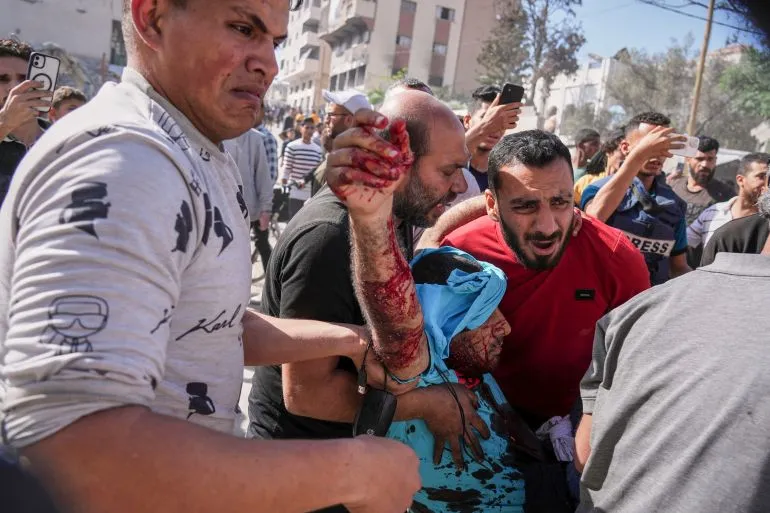Tragedy in Gaza: Rising Casualties Amid Aid Restrictions
As the conflict between Israel and Palestinian militants continues to escalate, the situation in Gaza has taken a devastating turn with increasing casualties, particularly among the children. Recent Israeli airstrikes have led to the deaths of at least 21 individuals, further highlighting the dire humanitarian crisis that has emerged due to an ongoing blockade of aid to the region.
The Latest Updates: A Harrowing Toll
Reports from various news sources indicate that in one of the deadliest days in recent months, Israeli airstrikes killed at least 33 people at a restaurant and market in Gaza City, marking a significant intensification of military operations in the area. The health ministry in Gaza has confirmed that many of the deceased are civilians, with children being among the casualties.
Aid Blockade and the Humanitarian Crisis
The blockade of aid to Gaza has long been a source of contention and controversy. With the ongoing strikes, the Palestinian territory faces a critical humanitarian crisis exacerbated by restrictions that limit access to essential resources. Organizations such as the United Nations and various humanitarian groups have repeatedly called for increased aid flow to alleviate the suffering of approximately two million Gazans. The blockade, in tandem with armed conflict, has left many families without access to food, medical supplies, and other necessities.
The Voices of the Affected
Families affected by the strikes have expressed their grief and hopelessness. Parents mourn the loss of their loved ones and struggle to provide for their surviving children, fearing further violence that could claim more innocent lives. “Every day we live in fear,” said one resident of Gaza. “We need peace; we need our children to be safe.”
International Reaction and Calls for Action
International reactions have varied, with some nations condemning the violence and calling for an immediate ceasefire. Human rights organizations are urging the international community to take action to protect civilians, particularly children, who are disproportionately affected by the ongoing violence. “It is crucial to prioritize the protection of innocent lives,” said a spokesperson for a prominent humanitarian group. “No child should have to bear the burden of conflict.”
Understanding the Complex History
The Israeli-Palestinian conflict has deep historical roots that span generations. Disputes over land, resources, and governance have fueled hostility and violence in the region. This ongoing tension is exacerbated by external factors, including politics, international diplomacy, and the involvement of various nations and organizations.
The complexities of the conflict result in widespread suffering on both sides, yet the humanitarian consequences in Gaza have reached an alarming level. The effects of military operations not only claim lives but also destroy homes, schools, and hospitals, creating long-lasting impacts on the civilian population.
Life Under Siege
Living under constant threat of airstrikes has transformed everyday life in Gaza. The sound of sirens and explosions have become a haunting backdrop for the community. Parents face the heart-wrenching choice of sending their children to school or keeping them home in the hope of protecting them from the violence. These choices are further compounded by shortages of food, clean water, and medical care.
What’s Next?
The question of what lies ahead for Gaza remains uncertain. As the international community continues to navigate the complexities of the conflict, the hope remains that dialogues for peace and humanitarian efforts can succeed. Progress is essential to ensure the safety and well-being of those caught in the crossfire.
As airstrikes continue and civilian casualties rise, the global community must act decisively to address the humanitarian needs in Gaza while working toward a sustainable and peaceful resolution to the Israeli-Palestinian conflict. Lives depend on it.
Conclusion: A Call for Compassion and Action
In the wake of tragedy and loss, the plight of innocent civilians, particularly children, serves as a somber reminder of the urgent need for compassion and direct action. With so many lives hanging in the balance, it is time for a robust response that prioritizes humanity and fosters an environment of lasting peace.
As we reflect on these recent events in Gaza, may we advocate for an end to violence and renewed commitment toward humanitarian aid efforts. The future of a generation relies on our ability to act, ensuring that no more lives are lost unnecessarily.







